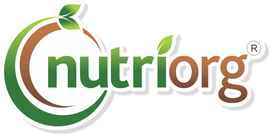
Top 10 Benefits of using Organic Food Products
Is organic food truly better for you? Is it great value for money? Learn what the labels signify and which foods provide the most value for the price.
Nowadays, it's uncommon to find a grocery shop without an organic produce area. This is because the organic food sector is thriving. According to the Organic Trade Association, Americans now spend 47 billion dollars on organic food each year. That's a 3.7 billion dollar rise over the previous year, and there's no sign of it slowing down any time soon.
While the price tag on organic food may make your pocketbook groan, your heart will thank you! The advantages of organic catering and eating much surpass the little cost difference.
What does “organic” mean?
The manner agricultural products are cultivated and processed is referred to as "organic." An organic product is made from organically grown ingredients. Organic food goods are the most well-known organic products. However, organic agriculture can also be used to produce apparel and personal care products.
Advantages of organic food products
Your mental and emotional health, as well as the environment, are all affected by how your food is produced or processed. People with sensitivities to products, chemicals, or preservatives may discover that their symptoms reduce or disappear when they eat solely organic foods.
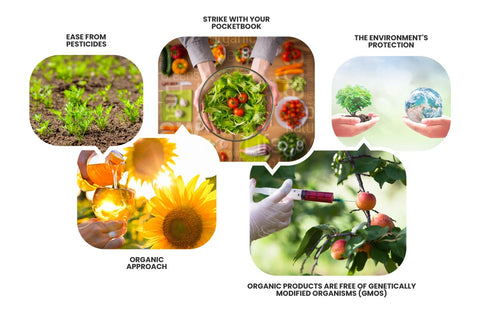
- Ease from Pesticides
Pesticides are less prevalent in organic food items. In conventional agriculture, chemicals such as synthetic fungicides, herbicides, and insecticides are frequently utilized, and residues linger on (and in) the food we consume. Organic food is frequently fresh since it lacks preservatives that extend its shelf life.
- Organic Approach
Organic farming is generally more environmentally friendly. Organic agricultural approaches have the potential to minimize contamination, conserve resources, prevent soil erosion, boost soil fertility, and use less power.
- Strike with your pocketbook
One of the most important advantages of eating organic food is that you are voting with your money. Non-organic farmers, grocers, GMO labs, and chemical firms will realize that you do not promote their industry with every item you buy. This motivates conventional farmers to consider organic farming as a viable option.
Organic farming's future appears to be promising today. There are numerous advantages to consuming organic food and seeking out organic component substitutes. It's never too late to start anything new. It's never too late to spread the word about the advantages of organic food and consumption!
- The Environment's Protection
Factory farming pollutes our land, rivers, and oceans considerably. Farmers' usage of pesticides and fertilizers resulted in high levels of nitrates in two-thirds of the country's drinking water. These contaminants aren't just found in our tap water. They continue to contaminate our food and the ecosystems. Due to extremely soluble synthetic fertilizer usage, scientists discovered 405 oceanic dead zones in 2008.
By choosing an organic products-based company, you support organic farmers and agriculture that employs natural fertilizers for their crops, keeping our ecology robust and growing.
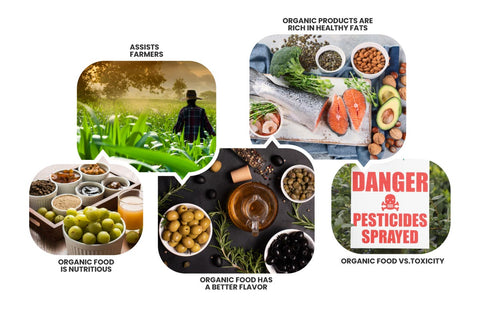
- Organic products are free of Genetically Modified Organisms (GMOs).
A Genetically Modified Food is an organism whose DNA has been altered in a laboratory setting. This is done to give food advantages like better color, shorter growing cycles, larger crop yields, and so on. Have you ever wondered how that forgotten head of lettuce in the back of the fridge remains crisp? That's because someone tampered with the plant's genes, causing it to live six times longer than nature intended.
GMOs have been kept out of the FDA's organic certification process by the organic food sector, which means that all organic foods are naturally free of GMOs.
- Assists Farmers
When you eat organic food, you're eating food that has been held to a higher standard. Before the FDA can declare a food "Certified Organic," it must meet stringent requirements. This signifies that the farmer who grew your tomato spent a lot of time and effort to ensure that their land was free of chemicals. Toxic-free soil and water tables might take years to achieve before organic crops can be grown.
You are supporting genuine farmers when you buy organic food! Organic farmers pay a higher price to follow organic requirements, produce fewer crops per acre, and keep fewer cattle on small plots of land so that they have more room to wander. All of this adds to the costs and risks faced by farmers who are attempting to do the right thing.
- Organic products are rich in healthy fats
As I stated, "good fat!" When you eat organic protein like chicken, pork, and fish, you're giving your body more of the beneficial omega-3 fatty acids and fewer of the cholesterol-raising fats found in conventionally reared livestock. Non-organic milk has half the amount of omega-3 fatty acids as organic milk.
What are the benefits of omega-3 fatty acids? It can help battle melancholy, cut your risk of cardiovascular disease, lessen joint pain or rigidity, lower your risk of developing cancer, prevent dry patches, and boost memory.
- Organic food is Nutritious
Organic products such as Organic Amla Juice, Organic Chyawanprash, and others should be added to your shopping basket if you wish to reap the benefits of eating healthy. Organic products have a higher concentration of vitamins and minerals. All of that extra nutrients help the body build its immune system, decrease blood pressure, and slow down the ageing process.
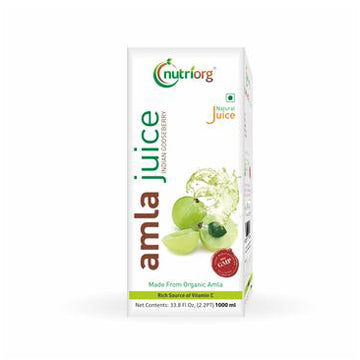
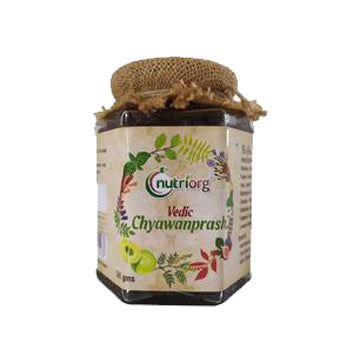
- Organic Food vs.Toxicity
We are all familiar with the dangers of synthetic pesticides and fertilizers. Farmers who work hard in the fields to provide us with natural vegetables die as a result of chemical exposure, and we have seen how pesticides damage the local water table and soil pollution levels.
Long-term pesticide exposure has substantial health hazards, according to a Penn State study published in 2017. "Birth abnormalities, fetal toxicity, formation of benign or malignant tumors, genetic alterations, blood illnesses, nerve disorders, endocrine disruption, and reproductive consequences are all anticipated chronic effects of acute poisoning."
One of the key advantages of eating organically farmed food is avoiding exposure to toxins.
- Organic Food Has a Better Flavor
Chemicals and genetic manipulation can affect the flavor of some of your favorite foods, but organic food is free of both. One of the biggest advantages of consuming organic products is that they taste the way they should.
Nutriorg believes in its country's farmers and supports and promotes its efforts by providing 'Organic Products' to its customers. We design items with our customers' health in mind and strive to provide them with the best of the world. When it comes to eating, we all have high expectations and want to consume better, healthier meals so we don't cut corners when it comes to eating. Our motto is to deliver the best service possible while remaining entirely honest with our clients.


